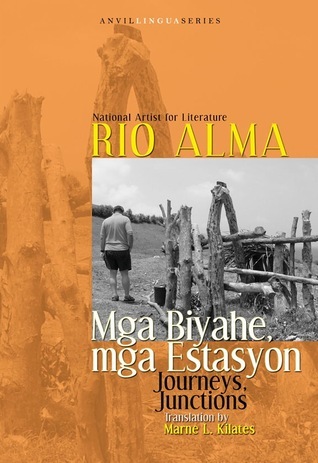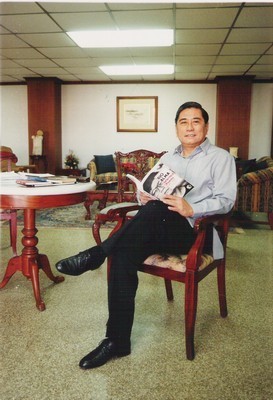
Even while wearing his many hats as educator, activist, editor, journalist, university professor and cultural administrator, (Virgilio S. Almario in his role as critic and literary historian) has always been a poet and a traveler. The poems in this collection are culled from his last ten poetry books that individually and invariably include a poem or a group of poems on places where the poet has traveled. Among these poems, too, might be felt most the characteristic tension between home and destination, the past and the present, and the febrile twilight in-between where the poet-traveler finds himself, whether it is in Vigan or Davao, Sta. Fe or at the foot of Mayon, or away from home shores in Sofia, Sounion or Stonehenge. And because Rio Alma is Rio Alma, the persona in these poems of wandering, sometimes of displacement and alienation, is always Filipino. It is this Filipino-ness, which governs all his poetry and resides naturally in the original, that the translator must, with any merit at all, transpose, "trans-relate" into this sometimes cumbersome, sometimes wanting, second language of ours.
Author

Virgilio S. Almario, better known by his pen name, Rio Alma, is a Filipino artist, poet, critic, translator, editor, teacher, and cultural manager. He is a National Artist of the Philippines. Growing up in Bulacan among peasants, Almario sought his education in Manila and completed his degree in A.B. Political Science at the University of the Philippines. A prolific writer, he spearheaded the second successful modernist movement in Filipino poetry together with Rogelio G. Mangahas and Lamberto E. Antonio. His earliest pieces of literary criticism were collected in Ang Makata sa Panahon ng Makina (1972), now considered the first book of literary criticism in Filipino. Later, in the years of martial law, he set aside modernism and formalism and took interest in nationalism, politics and activist movement. As critic, his critical works deal with the issue of national language. Aside from being a critic, Almario engaged in translating and editing. He has translated the best contemporary poets of the world. He has also translated for theater production the plays of Nick Joaquin, Bertolt Brecht, Euripedes and Maxim Gorki. Other important translations include the famous works of the Philippines' national hero, José Rizal, namely Noli Me Tangere and El Filibusterismo. It was deemed as the best translation by the Manila Critics Circle. Almario has been a recipient of numerous awards such as several Palanca Awards, two grand prizes from the Cultural Center of the Philippines, the Makata ng Taon of the Komisyon sa Wikang Filipino, the TOYM for literature, and the Southeast Asia Write Award of Bangkok. He was an instructor at the Ateneo de Manila University from 1969-1972. He only took his M.A. in Filipino in 1974 in the University of the Philippines. In 2003, he was appointed Dean of the College of Arts and Letters in the said university. In June 25 of the same year, he was proclaimed National Artist for Literature. Almario is also the founder and workshop director of the Linangan sa Imahen, Retorika, at Anyo (LIRA), an organization of poets who write in Filipino. Award-winning writers and poets such as Roberto and Rebecca Añonuevo, Romulo Baquiran Jr., Michael Coroza, Jerry Gracio, and Vim Nadera are but some of the products of the LIRA workshop.